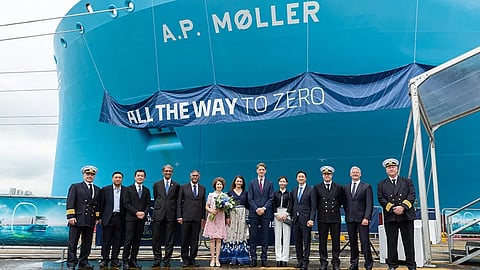Maersk Names Newest Dual-Fuel Methanol Vessel 'A.P. Møller'
A.P. Moller - Maersk (Maersk) celebrated the arrival of its newest dual-fuel methanol container vessel in Singapore, as part of her maiden voyage from Asia to Europe.
The vessel, named “A.P. Møller” in honor of Arnold Peter Møller, the founder of A.P. Moller - Maersk, is the ninth vessel in Maersk’s fleet capable of operating on methanol.
Ms. Chan Su-Shan, the wife of the CEO of Temasek Holdings in Singapore, was the godmother of the “A.P. Møller”.
Mr Murali PillaiMinister of State, Ministry of Law and Ministry of Transport said: "Today marks a significant milestone in our journey of decarbonising the maritime industry.
"The arrival of 'A.P. Møller' in Singapore not only showcases the advancements in shipping technology but also reinforces our commitment to support solutions that can reduce greenhouse gas emissions. W
"We are glad to collaborate with Maersk and look forward to furthering our efforts to make Singapore a leading hub for new maritime fuels."
“A.P. Møller” is part of a series of 18 large dual-fuel methanol vessels scheduled for delivery in 2024 and 2025.
Maersk Transforms India Warehouse into an All-Women-Operated Facility
Built at Hyundai Heavy Industries in Ulsan, South Korea, she can carry 16,592 standard containers (TEU). Seven of these large dual-fuel methanol vessels joined the Maersk fleet in 2024.
In July 2023, the inaugural ship-to-containership methanol bunkering for the Laura Maersk was conducted in Singapore with the support of the Maritime and Port Authority of Singapore.
This was also the first ship-to-ship methanol bunkering in the country, marking a long-lasting partnership and support for Singapore's ambition to supply methanol at scale and become a key offtake location for alternative maritime fuels like methanol.
The delivery of the dual-fuel fleet is a significant component of Maersk’s decarbonisation goal of achieving net-zero greenhouse gas (GHG) emission by 2040.
Lower emission methanol can reduce the GHG emissions by at least 65% compared to conventional fossil fuels such as bunker oil (depending on the feedstock and production process of the methanol, calculated on a life cycle basis).
With the vessel technologies available, Maersk has been urging the International Maritime Organisation (IMO) member countries to adopt ambitious regulations that bridge the price gap between fossil fuels and the alternatives with lower greenhouse gas emissions, making the reduced emissions transport choice viable and competitive.


